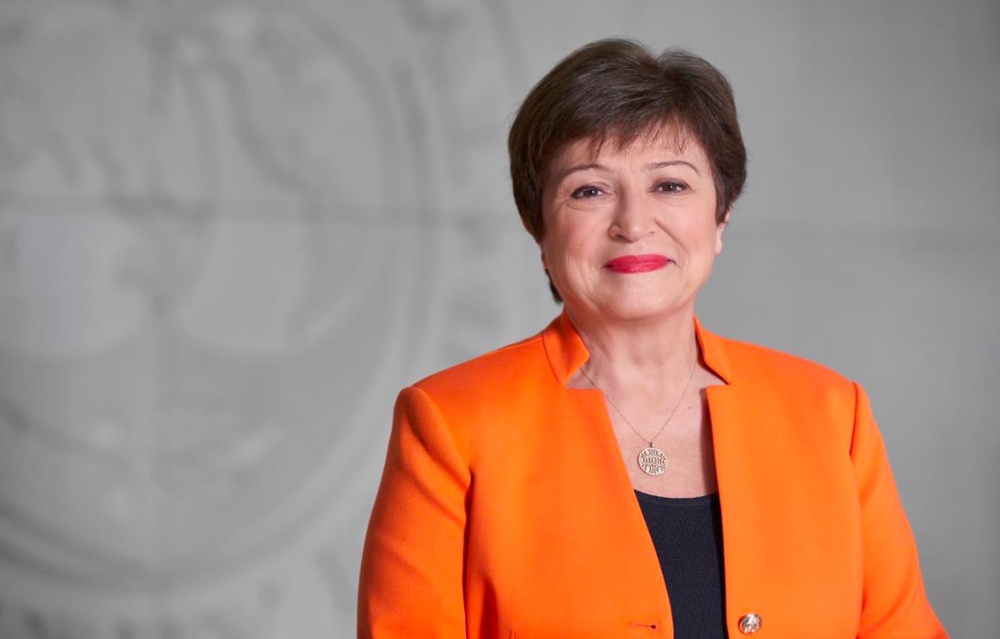IMF’s Head Georgieva Discusses Cooperation with Central Asia, Assistance to Kazakhstan Toward Carbon Neutrality in Exclusive Interview
 Kristalina Georgieva.
Kristalina Georgieva.International Monetary Fund (IMF) cooperation with Central Asia, global economic outlook, and the prospects of assisting Kazakhstan achieve carbon neutrality were at the center of a conversation of IMF Managing Director with The Astana Times ahead of her participation at the Astana International Forum (AIF).
Georgieva noted that the IMF predicts global GDP growth of 2.8% in 2023 and 3% in 2024, with persistent inflation and financial-sector pressures adding to the global economy’s uncertainty.
“High debt levels, geoeconomic fragmentation, and climate change pose significant challenges. This clouds everyone’s prospects—especially the most vulnerable,” she said.
Global inflation is anticipated to be 7% in 2023, with core inflation not likely to fall to central banks’ targets until 2025. With this in mind, the IMF recommends central banks to maintain tight monetary policy.
As for Central Asian economies, Georgieva said they performed relatively strongly in 2022. According to her, amid turbulent geopolitical shifts, Kazakhstan found itself heavily exposed to the costs of geo-economic fragmentation and climate change.
“For Kazakhstan, we project growth to accelerate from 4.3% in 2023, to 4.9% in 2024. This rather strong activity is encouraging because it comes mostly from the non-oil sectors of the economy,” she said.
Despite recent solid economic results, the IMF managing director noted that countries in the region need to accelerate market-oriented reforms.
“At the IMF, we found that structural reforms could boost CCA [countries of Central Asia] output by 5 to 7% in the medium term. On my trip, we plan to release an IMF paper that contains those findings. Reforms to reduce the role of the state, for example, could significantly boost medium-term growth—helping cushion the economy against future shocks,” Georgieva said.
To assist Kazakhstan and other countries of the region, IMF opened the Caucasus, Central Asia, and Mongolia Regional Capacity Development Center (CCAMTAC) virtually on Feb. 1, 2021, ahead of its in-person launch in Almaty.
A collaborative venture between the IMF, nine member countries (Armenia, Azerbaijan, Georgia, Kazakhstan, Kyrgyz Republic, Mongolia, Tajikistan, Turkmenistan, and Uzbekistan), and development partners, it serves a diverse and dynamic region of 80 million people.
During her visit, Kristalina Georgieva will participate in the formal opening of the center in Almaty, a significant step in deepening the IMF’s engagement to support the region’s economic potential.
“The center is already a hub for capacity development and training in the region,” she said.
According to Georgieva, the CCAMTAC contributed significantly to capacity development and training, another pillar of the IMF’s support for Kazakhstan.
“We have supported your efforts to modernize your institutions and strengthen monetary policy, financial supervision, public financial management, and statistical frameworks,” she said.
Georgieva highlighted the ongoing efforts of the IMF in assisting the region as it did during the early years following independence and later during the global financial crisis and the pandemic.
“Our response to the COVID shock was swift and sweeping. Overall, we provided $800 million in emergency financing to low-income countries in the region...We stand ready to help as you continue on your journey to achieve robust, sustainable, inclusive growth,” she said.
Among recent efforts, Georgieva highlighted a Special Drawing Rights allocation of around $1.6 billion to Kazakhstan by the IMF to boost reserves and support the country’s already large external buffers.
IMF managing director Georgieva also addressed climate change. According to her, it gravely threatens macroeconomic and financial stability. She commended Kazakhstan’s climate-related commitments despite it being a country so heavily reliant on fossil fuels.
“Kazakhstan will need a comprehensive set of reforms to adapt to the impact of climate change, to mitigate carbon emissions, and to prepare for an economic transition away from its dependence on fossil fuels, given global decarbonization. These transformations toward a greener, more diversified economy will require a combination of higher fossil fuel prices and increased public and private investment,” she said.
Georgieva added that the IMF is ready to support Kazakhstan’s efforts in this area by providing comprehensive advice on how to improve the quality of public investment, build low-carbon and climate-resilient infrastructure, and strengthen Kazakhstan’s social safety net to mitigate the transition’s impact on the most vulnerable.
About the Embassy
The Embassy of the Republic of Kazakhstan in the Kingdom of Sweden and in the Kingdom of Denmark was opened on March 8, 2014 by direct decree of the President of the Republic of Kazakhstan with a view to strengthening diplomatic relations. The site is introduced to keep the wide public informed on activity of the diplomatic mission in Sweden, and to provide information support for the citizens of Kazakhstan who live in Sweden and foreigners who are going to visit Kazakhstan as tourists or businessmen.
Contacts

Aibek Yessey
- a.esei@mfa.kz
- +46 76-298 53 99
- +46 (0) 8 700 51 41